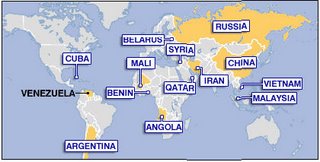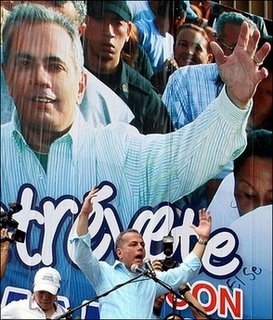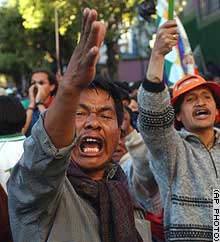Intensifying labor strife, political infighting and budgetary pressures are threatening to chip away at the domestic support of Bolivian President Evo Morales, who took office in January promising to nationalize the natural gas industry and to achieve social equality for the country’s indigenous majority. [Aug. 31 The Washington Post on Morales’s inability to fund his socialist agenda]
Alas, this illustrative and instructive paragraph explains why the socialist counter-revolution championed by Venezuelan President Hugo Chavez – to forestall and rollback U.S. influence throughout Latin America and the Caribbean – is faltering.
After all, just a year ago, regional leaders were eager to implement Chávez’s socialist agenda. They seemed blithely unconcerned that doing so would defy the capitalist reforms President George W. Bush mandated for their sustainable development and, more important, for good relations with the United States. Moreover, with candidates riding his coat-tails to the presidency in Uruguay, Chile and Bolivia (to say nothing of being acclaimed as Fidel Castro’s political heir), Chavez was poised to usurp Bush as the most influential leader in the Western Hemisphere.
But, as dynamic and appealing as Chavez’s socialist agenda seemed last year, it is moribund and fractious this year. And, where political candidates coveted Chavez’s endorsement last year, they are hanging any association with him like an albatross around the necks of their opponents this year – with great effect, as I chronicled here a few months ago.
 In fairness to Chavez, however, he’s not solely to blame for Bolivia’s political strife and economic stagnation. Because, like many regional leaders, its newly-elected president, Evo Morales (photographed here as Chavez’s always eager pupil), failed to appreciate that it was Venezuela’s oil, not Chavez’s agenda, that allowed him to play Robin Hood to his country’s peasants and thumb his nose at the U.S.
In fairness to Chavez, however, he’s not solely to blame for Bolivia’s political strife and economic stagnation. Because, like many regional leaders, its newly-elected president, Evo Morales (photographed here as Chavez’s always eager pupil), failed to appreciate that it was Venezuela’s oil, not Chavez’s agenda, that allowed him to play Robin Hood to his country’s peasants and thumb his nose at the U.S.
On the other hand, his disciples have now realized that not only do they not have the revenues to fund similar welfare programs; but far more disillusioning, that – despite his oil wealth – the aid Chavez offers is more rhetorical than financial (as I refined in a recent column here on his highly-touted PetroCaribe initiative).
Moreover, the irony should not be lost on anyone in this region that Chavez is providing more subsidized oil to the Chinese than to the Latin American and Caribbean leaders who bought into his socialist counter-revolution hook, line and sinker. Indeed, it behooves these leaders to be mindful that, like Morales, they too could soon find the poor mobs they once led in protests – to demand welfare guarantees from putatively pro-American governments – now marching in protest against them.

Finally, apropos illustrative and instructive behavior, Chavez’s recent world tour (mapped-out above) should disabuse anyone of the notion that he’s executing a comprehensive plan to build socialist economies throughout the Americas. Because while his most high-profile disciple, Andres Manuel Lopez Obrador, was struggling to pull-off an upset victory in Mexico, Chavez was either serving as Castro’s nurse and propagandist or currying favor with any world leader who shares his enmity for Bush – regardless of that leader’s political orientation. (How else does one explain the socialist Chavez hobnobbing with an Islamic fascist like Iranian President Mahmoud Ahmadinejad?)
Meanwhile, notwithstanding his attempt to put his money where his mouth is, Chavez is facing growing disillusionment with his socialist agenda even at home in Venezuela. And he’s becoming sufficiently paranoid about his grip on power that he’s resorting to the old canard of accusing opposition leaders of planning a coup.
 As it happens, his domestic foes have, in fact, launched an open conspiracy to oust him from office. Because, in an unprecedented move in the annals of Third World politics, 26 opposition parties have set aside their differences and nominated a consensus candidate, Manuel Rosales, to oppose Chavez in the 3 December presidential election. And, in an ironic twist, Rosales – former governor of the western oil state of Zulia – is promising to spend less time and money on anti-Bush foreign adventures and more on alleviating poverty and rebuilding Venezuela’s crumbling infrastructure.
As it happens, his domestic foes have, in fact, launched an open conspiracy to oust him from office. Because, in an unprecedented move in the annals of Third World politics, 26 opposition parties have set aside their differences and nominated a consensus candidate, Manuel Rosales, to oppose Chavez in the 3 December presidential election. And, in an ironic twist, Rosales – former governor of the western oil state of Zulia – is promising to spend less time and money on anti-Bush foreign adventures and more on alleviating poverty and rebuilding Venezuela’s crumbling infrastructure.
I am the candidate of the Venezuelan fatherland…not one more barrel of oil, not a dollar more, is leaving Venezuela as long as there is poverty and misery in this country. [Manuel Rosales]
NOTE: Even I bought Chavez’s socialist rhetoric of empowering the poor throughout the region. But I soon I realized that he was only interested in enlisting regional leaders to enable his paranoid delusions of grandeur. And that his agenda had more to do with undermining Bush’s presidency than helping poor countries, including his own, build sustainable economies.
In fact, it is now patently clear that Chavez is deteremined to emulate Castro by manufacturing fears of a U.S. invasion to maintain dictatorial control over Venezuela and serve as regional martyr for the next 50 years. And he has vowed that – if reelected – he would amend the Venezuelan constitution so that he could rule as president for life….
And, despite growing disaffection with his leadership, Chavez seems more covetous of being a member of Bush’s axis of evil than a champion of Third World development. Indeed, this is why he will be showing up at the UN’s annual general assembly in 10 days, not aligned with the Latin American and Caribbean leaders he misled, but locked in arms with Bush’s arch-enemy, Iranian President Mahmoud Ahmadinejad!
UPDATE (9
:06 am): I assumed it was self-evident, but since a number of you have enquired: Yes, I think regional politics and governance in Venezuela would improve immeasurably if Chavez were defeated in December. After all, he has turned out to be more of a regional buffoon than the Bolivarian statesman he promised he would become….
Bolivian economy, Evo Morales, Hugo Chavez

WeblogBahamas.com says
Concensus is finally building that Chavez is not good for the region or the world.
It’s about time.
At http://www.nassauinstitute.org and http://www.weblogbahamas.com have been cautioning on both Chavez and PetroCaribe for sometime now.